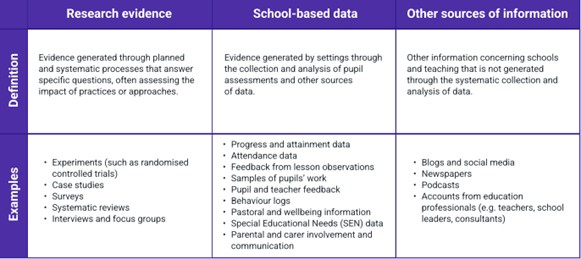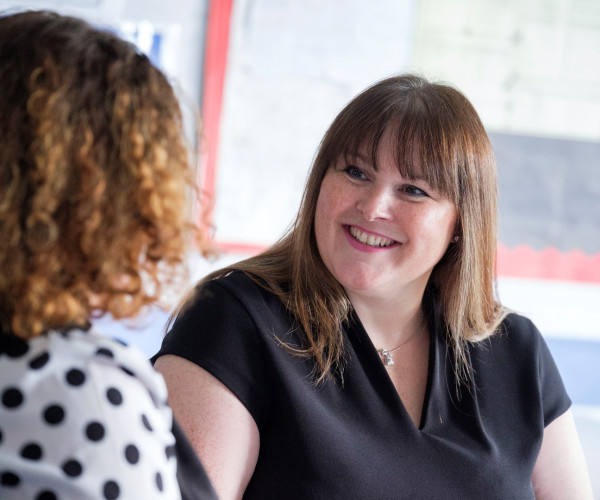Spotlight on the EEF Research Schools and the Use of Research Evidence in Education
Posted 16th April 2024
The Rise of the Use of Research Evidence in Education – an opportunity and a challenge?
by Jane Elsworth, Deputy Headteacher and Director of Huntington Research School
Across North Yorkshire and Leeds, many of you are aware of the work of the Educational Endowment Foundation (EEF) and their Yorkshire-based research schools and have been increasingly involved with projects, trials, and communication events in recent years. The EEF’s mission is to break the link between family income and educational achievement.
Education inequality in England is entrenched. By the time they start school, a child born into a socio-economically disadvantaged family is already less likely to meet expected levels of language, communication and physical development. These gaps widen throughout primary and secondary school. The EEF and their Research School Network are committed to achieving their mission by supporting schools, nurseries, and colleges to improve teaching and learning for 2 – 19-year-olds through better use of research evidence.

They do this by:
- Summarising evidence. Reviewing the best available evidence on teaching and learning and presenting it in an accessible way.
- Finding new evidence. Funding independent evaluations of programmes and approaches that aim to raise the attainment of children and young people from socio-economically disadvantaged backgrounds.
- Putting evidence to use. Supporting educational practitioners, as well as policy makers and other organisations, to use evidence in ways that improve teaching and learning.
Since the Research School Network was launched in 2016, the use of research evidence in education has grown exponentially. The increased accessibility to research evidence produced by organisations like the EEF, the Chartered College, Evidence Based Education, to name but a few, has supported this and the profession has embraced these developments in professional development and school improvement work. The updated ITT Core Content Framework (CCF) and Early Career Framework (ECF) are underpinned by the best available evidence and our early career teachers and their mentors are fast becoming some of our most evidence-informed practitioners.
However, developing evidence literacy (being able to find, critique and integrate claims, drawing on a range of sources and ‘dig deeper’) and using evidence effectively (effective implementation) to lever positive change is not easy in a time-pressured education system. However, a new guide and associated resources have been produced by the EEF to support practitioners and school, nursery and college leaders to do just this. You can download the guide on the following link: Using research evidence | EEF (educationendowmentfoundation.org.uk).
Evidence is a broad term that means different things in education, from school-based data to externally collated meta-analyses. However, not all evidence is drawn from research. The following table from the guide gives examples of research evidence, school-based evidence and other forms of information.

The guide goes onto explore what we mean by ‘good’ evidence. It is important to note that the way in which research is conducted varies and it is not possible to say that one kind of research is definitely better than any other, as they all have strengths and limitations. Instead, perhaps the question should be ‘what counts as good evidence for this issue and this purpose’? The table on page 4 of the guide explores the uses and potential limitations of six different and commonly used types of research.
Making school improvement decisions based on research evidence is increasingly a part of education practice and this can help us to choose the best bets for our pupils. However, it is important to engage with credible evidence. Research evidence can vary and its quality and reliability. This depends on how the research was conducted and other factors that could introduce bias and affect the results. There are some ‘red flags’ which are useful to look out for when reading different types of research. The presence of these might make you sceptical about the reliability of the evidence you are reading. These can be remembered using the acronym, CLAIMS: conclusions, limitations, applicability, independence, methods, sample populations. This is further developed on page 6 of the guide.
While reading and evaluating research evidence can provide excellent insights into what has worked in the past, this alone is unlikely to improve practice and pupil outcomes. For improvements to be made, we need to actively apply research evidence by making changes to what we do.
The following questions might support your thinking as you consider using research evidence to inform practice:
- Will the potential for improvement from a change of practice outweigh the likely costs?
- Do these approaches fit the pupil and school needs, and what adaptions might be needed?
- What infrastructure, systems and people are required to make any changes in practice? How might we unite and engage people in our new approaches to give it the best chance of success?
- How will we monitor and evaluate the impact of the new approach, ideally using many of our current systems and structures?
I highly recommend the EEF’s Implementation and Effective Professional Development guidance reports to support you in putting any plans you have into effect. These, and their associated resources can be downloaded from the following links: Putting Evidence to Work - A School’s Guide to Implementation | EEF (educationendowmentfoundation.org.uk) and Effective Professional Development | EEF (educationendowmentfoundation.org.uk). An update to the Implementation guidance report is due later in April 2024, so do sign up to our newsletter to keep in touch with new guidance and resources and follow us on X at: @HuntResearchSch.





